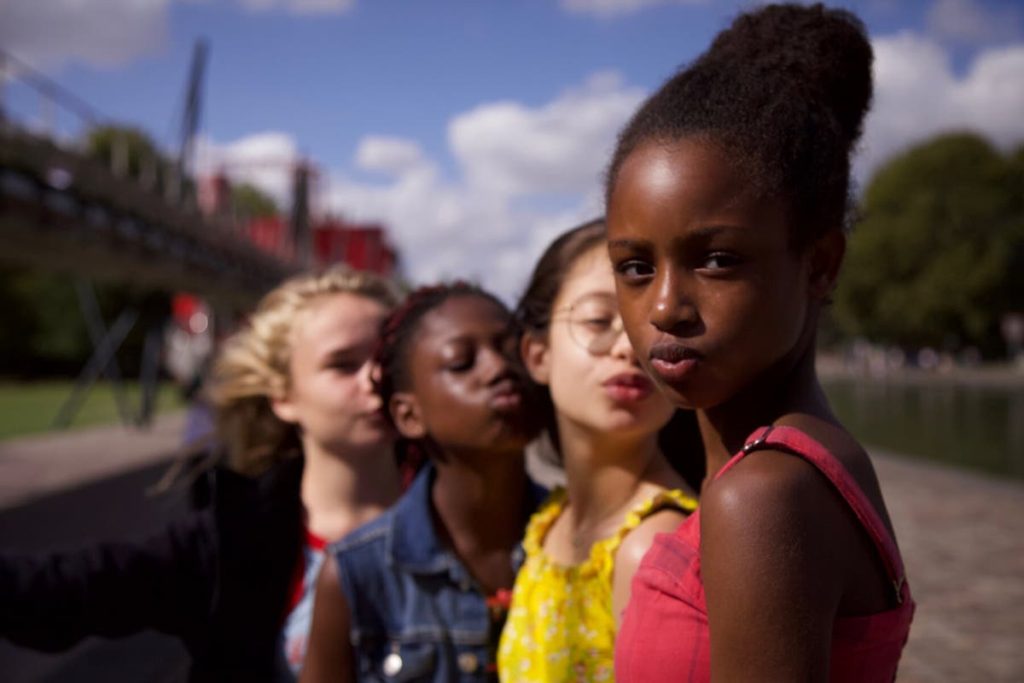Conspiracy theorists and concerned parents complained about the image associated with “Cuties,” a French film that examines how children are encouraged to be sexualized.
LONDON — Netflix has changed the promotional image for “Cuties,” an award-winning French film, after it was accused of sexualizing girls.
“We’re deeply sorry for the inappropriate artwork that we used for ‘Cuties,’” a spokeswoman for Netflix said. “It was not OK, nor was it representative of this French film which won an award at Sundance. We’ve now updated the pictures and description.”
Netflix’s original artwork promoting “Cuties” on the streaming service featured a picture of four young girls posed provocatively, some twerking while wearing hot pants. Now, the promotional image shows the lead actress, Fathia Youssouf, looking over her shoulder.
The complaints — posted in part by followers of the QAnon conspiracy theory — may have come as a surprise to some, given that “Cuties,” the debut feature by Maïmouna Doucouré, has been praised for questioning how society and social media pressure young children into acting in sexually explicit ways. Doucouré was named best director in the world cinema category at this year’s Sundance Film Festival and received a special mention at this year’s Berlinale festival in Germany.
The row began on Tuesday after Netflix published the trailer for “Cuties” online. It quickly drew criticism, as did the film’s artwork. “Parents who agreed to put their girls in this movie are pimps,” read one comment.
Some are still calling for the film, scheduled to land on Netflix on Sep. 9, to be deleted from the streaming service. One online petition, which had over 170,000 signatures on Friday, urged Netflix not to release it. “THIS PROBLEM ISNT THE ARTWORK ITS THE FACT ITS ABOUT TWERKING ELEVEN YEAR OLDS FOR ADULT VIEWING PLEASURE,” read an update to the petition, posted on Thursday. “TAKE IT DOWN WE HAVE THE SCREENSHOTS,” it added.
Calls to remove the film have gained particular traction among supporters of the QAnon conspiracy theory, who believe top Democrats and celebrities like the artist Marina Abramovic are behind a global child trafficking ring. “Netflix just normalized pedophilia,” one QAnon-supporting Facebook page posted on Friday.
The change to the artwork is only the latest example of Netflix facing pressure to remove content from its streaming platform on moral grounds. In July, it canceled production of a series in Turkey after authorities refused it a permit because the show included a gay character. In 2018, Netflix complied with a request from the Saudi Arabian government and removed an episode of the show “Patriot Act With Hasan Minhaj” from the platform in that country because it included criticism of Crown Prince Mohammed bin Salman.
The film itself — released as “Mignonnes” in France — has not caused any such rows. Doucouré’s debut feature, it follows the story of 11-year-old Amy (Youssouf) as she struggles to find her place in life. At home, Amy has to please her mother, a Muslim from Senegal, but she’s drawn to a group of friends who have their own dance troupe.
Doucouré said in June during an interview at the Sundance Film Festival that the idea for “Cuties” partly came to her after she attended an event in Paris, where she watched a group of 11-year-olds performing a highly sexualized dance. “I was so shocked,” she said. “For me, it was just, ‘Oh my God. What am I seeing?’” Many of the children’s parents, who were also watching the show, wore traditional religious dress, she added, and the culture shock fascinated her.
While researching the film, Doucouré became concerned about how social media pressures children to dress provocatively, she said.
In France, where the film was released in theaters on Aug. 19, “Cuties” has not stirred any controversy. Clarisse Fabre, reviewing the film for Le Monde, said, “The filmmaker skillfully refrains from passing judgment on the very explicit sexualization of the dance routines.” She named it a “must see.” Le Figaro, another newspaper, also labeled it a “film to see.”
Reviewers at Sundance didn’t see the film as fetishistic either. “The sight of twerking preteen bodies is explicitly designed to shock mature audiences into a contemplation of today’s destruction of innocence,” wrote Fionnuala Halligan in Screen Daily, but she added that the film ultimately failed because it tried too hard to provoke censure.
Doucouré hasn’t commented on the fuss or the artwork, and her representative did not respond to an interview request on Friday. But she may appreciate some of the ongoing debate about the sexualization of children in society. “We can’t continue to close our eyes about that,” she said in the interview at Sundance.
FEATURED IMAGE: Fathia Youssouf, right, in “Cuties.”Credit…Netflix
By Alex Marshall/The New York Times





